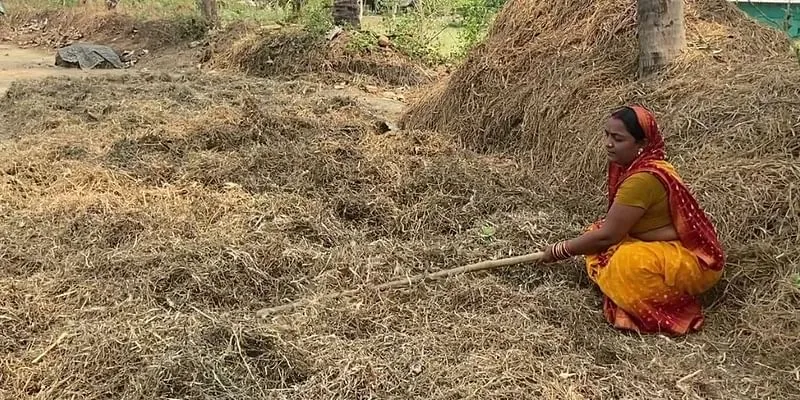Farmers switch to organic cultivation thanks to this ‘agri-friend’
Observing the rampant use of farm chemicals and resultant asthma among villagers, Geeta Rani Satpathy becomes a krishi mitra, and with an indirect approach convinces farmers to give up chemicals and practise organic cultivation.
Geeta Rani Satpathy of Angisingi in Odisha’s Nayagarh district is transforming the agricultural landscape of her village. Here’s her journey of how she convinced the farmers as a krishi mitra – in her own words.
"I was spurred into organic cultivation when I came to Angisingi after getting married.
"I observed farmers using a lot of chemical fertilisers and pesticides and realised that the farm chemicals were the reason for the asthma prevalent in the village.
"Soon my kids were also affected.
"I wanted to raise awareness about natural farming, to safeguard our environment and our society.
When I got to know about krishi mitra (agri-friend) positions as part of the Odisha Livelihood Mission for farmers, I decided that it was the best way to contribute to society.
"As a krishi mitra, I help farmers harvest more at less cost while protecting the environment. Initially, it was tough to convince Angisingi's farmers to practise organic cultivation.
"When I tried to educate the farmers on the ill effects of the farm chemicals, they didn’t take to me or my words kindly. They grumbled that my campaign was only for the sake of getting a salary.
"I practise organic farming in my field.
"I invited the farmers’ wives to my farm and told them about the benefits of organic farming. I showed them the transformation and proof of how I got more yield even after spending less.
"They found a noticeable difference in the flavour between organically and conventionally farmed produce.
The women brought their husbands to my farm and finally, the farmers were convinced.

"Now the farmers practise line sowing and germination tests and use organic pesticides and manure like jeevamrut, sathastra and matha-astra.
"I’m quite proud that many women of my village have become krishi mitras after seeing my work.
"Since I have to work with farmers and also do my household chores, I get up around 4 am. I cook, clean the house, etc. I crush neem leaves with my hands for my diabetic parents-in-law as the quantity is too small for the mixer.
"By the time I take care of my family’s needs and leave, the farmers have either returned from their fields or are having their breakfast.
"Still, I meet them. Sometimes other krishi mitras join me. We share the information through visuals, on a mobile phone or practically on demonstration plots. Farmers appreciate seeing the successful case studies.
"We also get the farmers’ feedback and ensure that they implement the methods taught in the previous meeting correctly. This helps on what steps need to be taken further.
"I’m back home by 5 pm. Then I prepare dinner and help my children with their studies.
"Earlier I had joined college but had to quit since my family disapproved. Nearly 20 years later, now that I’m self-sufficient, I’ve told my husband that I’d like to study. Also, he sees that I am making a good impact in the village, and people listen to my ideas.
"I’ve enrolled in a distance course because of all my responsibilities. My knowledge will increase if I study.
When I became a krishi mitra, I was given a target of 150 households. But because of my intervention as a krishi mitra, I’m proud to say that 260 families practise organic farming in Angisingi."
(This story has been provided by Village Square and is part of a special collaboration to highlight women-centric stories from rural India.)






